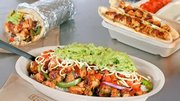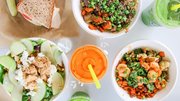Article
Fast casuals bliss out over plant-based ice cream
Ice cream and frozen novelties made up $304 million of the retail plant-based market in the U.S. as of April 2019, with revenues increasing 26% over last year and 67% over the previous two years.

October 17, 2019 by Cherryh Cansler — Editor, FastCasual.com
You've got to hand it to Americans. When we embrace a trend, we go all in, so it comes as no surprise that burgers were just the start of the plant-based craze. We've moved past lunch into the dessert category, where it's all about ice cream — without the cream — since "cream" equals "made from dairy," which is a big no-no in a segment that largely lacks animal derivatives.
Ice cream and frozen novelties made up $304 million of the U.S. retail plant-based market as of April 2019, and revenues increased 26% over the last year and 67% over the previous two years, according to the Good Food Institute. Another consumer report predicted that plant-based ice cream would increase more than 9% globably each year, hitting $3.4 billion by 2026.
And where there is any hot food trend, there are restaurants ready to grab a seat at the table, including Burgerville, a 41-unit chain based in the Pacific Northwest. In March, it partnered with Coconut Bliss, a plant-based ice cream company, to create a 100% plant-based version of its shakes. Made with cholesterol-free coconut milk, they come in any flavor on the Burgerville menu. Customers simply say, "Make it a Bliss" and receive a non-dairy shake for no additional charge, Jamie Powell, Burgerville VP of menu design and development, said in an interview with FastCasual.
"The growth of plant-based products across the industry is growing at a level that cannot be ignored, he said. "We knew the time was right. We could reach a growing consumer base and do it with an amazing locally produced product."
Although some of the Burgerville shakes are technically vegan, Powell prefers to use the term "plant-based," so it appeals to both the vegan consumer and the non-diary consumer.
"We have had to work diligently to train staff to determine which type of consumer is ordering, since some of our flavors include products that are not vegan," he said.
And the strategy is working, considering the plant-based shakes already make up over 10% of the chain's overall shake sales.
That's no surprise to Darcey Howard, Coconut Bliss director of marketing, who said offering plant-based products gives fast casuals an edge over competitors.
"By having plant-based options on their menu, fast casual restaurants are giving guests a bigger variety of options, and are including more patrons, especially those who have never been able to indulge in certain items on a fast casual menu before," she said in an interview. "Plant-based options provide inclusivity for consumers and can help widen a restaurant's customer base." Consumers are also willing to and expect to pay more for the solutions they seek. This kind of offering makes sense for both the brand and the consumer."
Nekter Juice, a 100-unit chain in based in California, was also an early adopter of dairy-free ice cream when it rolled out four vegan flavors — Monster Cookie Dough, Peanut Butter Swirl, Orange Twist and Chocolate Haze — June 27 and sold out July 1st.
"We had had to pull a lot of strings to get back into production, CEO Steve Schulze said in an interview. "Needless to say (it was) a huge success. and you will see it back in the stores May 2020. What we've realized is that while most people desire/strive for a healthy lifestyle, they also want to satiate that decadent desire."
Fatburger is another fast casual that has recently launched vegan vegan milkshakes. Made with hand-scooped Craig's Vegan Ice Cream, they are available in vanilla and strawberry in several California locations. They cost between $10 and $11, nearly double the price of the chains' traditional shakes, CEO Andy Wiederhorn said in an interview with FastCasual.
"With the success we've experienced since the introduction of our vegan Impossible Burger offering, we felt that partnering with Craig's (an iconic Hollywood hot-spot) and introducing new, high-quality, Craig's Vegan Ice Cream milkshake offerings was a natural fit/pairing with the Impossible Burger and its customer base in our restaurants," he said.
Large chains are also embracing dairy-free desserts. Baskin-Robbins, for example, debuted animal-free flavors this summer in U.S. stores.
Its two non-dairy flavors — chocolate extreme and chocolate chip cookie dough — are made with coconut oil and almond butter, which the brand said creates a rich frozen treat that is indiscernible from its full-dairy cousins.
"The Baskin-Robbins culinary team has been hard at work on our non-dairy flavors for over two years. It was important for us to take the time to get it right," said Baskin-Robbins Director of Research and Development Jeanne Bolger. "Both flavors are so smooth and indulgent, and the final product delivers the incredible quality that our customers have come to expect from any Baskin-Robbins ice cream."
 ChatGPT
ChatGPT Grok
Grok Perplexity
Perplexity Claude
Claude












